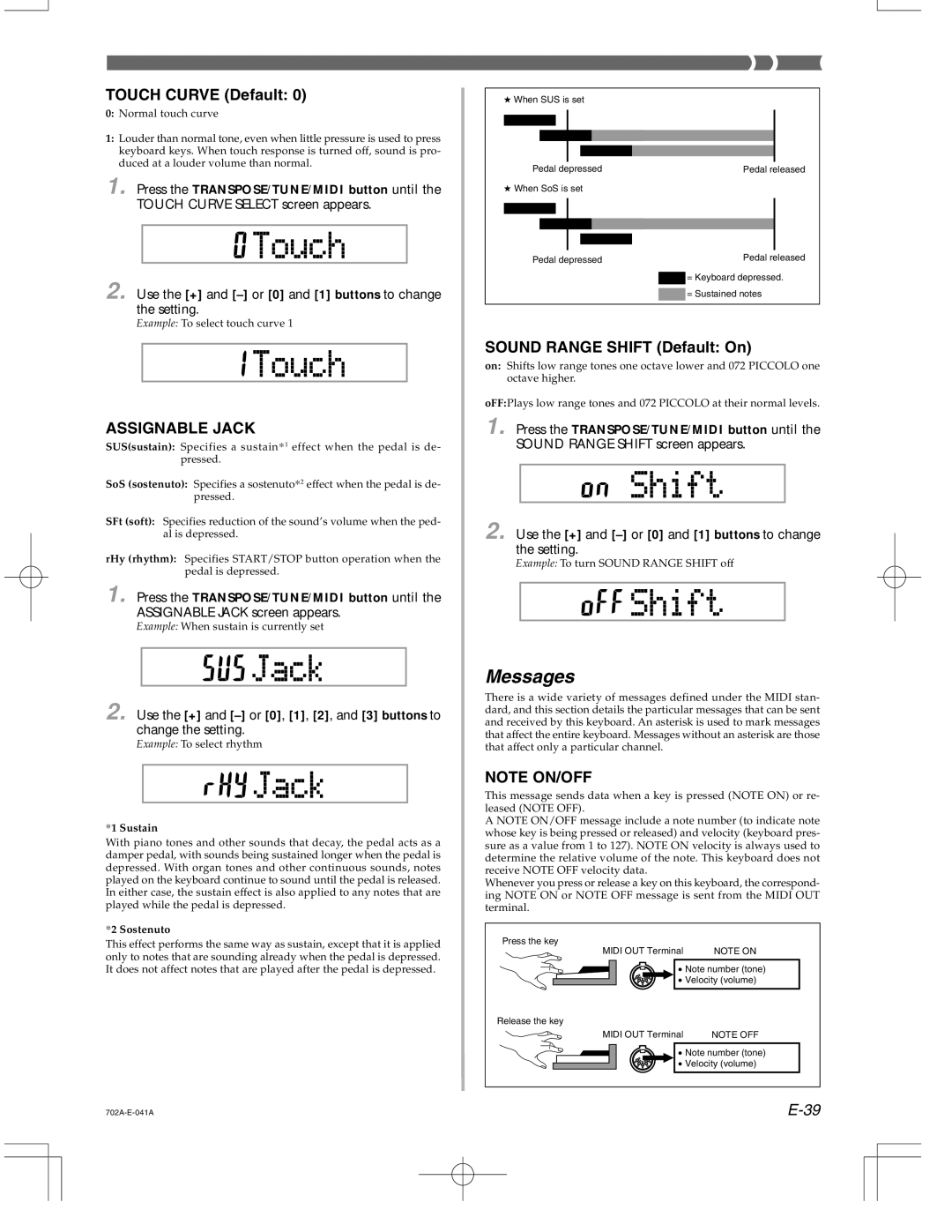
TOUCH CURVE (Default: 0)
0:Normal touch curve
1:Louder than normal tone, even when little pressure is used to press keyboard keys. When touch response is turned off, sound is pro- duced at a louder volume than normal.
1. Press the TRANSPOSE/TUNE/MIDI button until the TOUCH CURVE SELECT screen appears.
2. Use the [+] and [–] or [0] and [1] buttons to change the setting.
Example: To select touch curve 1
ASSIGNABLE JACK
SUS(sustain): Specifies a sustain*1 effect when the pedal is de- pressed.
SoS (sostenuto): Specifies a sostenuto*2 effect when the pedal is de- pressed.
SFt (soft): Specifies reduction of the sound’s volume when the ped- al is depressed.
rHy (rhythm): Specifies START/STOP button operation when the pedal is depressed.
1. Press the TRANSPOSE/TUNE/MIDI button until the ASSIGNABLE JACK screen appears.
Example: When sustain is currently set
2. Use the [+] and
Example: To select rhythm
*1 Sustain
With piano tones and other sounds that decay, the pedal acts as a damper pedal, with sounds being sustained longer when the pedal is depressed. With organ tones and other continuous sounds, notes played on the keyboard continue to sound until the pedal is released. In either case, the sustain effect is also applied to any notes that are played while the pedal is depressed.
*2 Sostenuto
This effect performs the same way as sustain, except that it is applied only to notes that are sounding already when the pedal is depressed. It does not affect notes that are played after the pedal is depressed.
★When SUS is set
Pedal depressed | Pedal released |
★When SoS is set
Pedal depressed | Pedal released |
= Keyboard depressed. = Sustained notes
SOUND RANGE SHIFT (Default: On)
on: Shifts low range tones one octave lower and 072 PICCOLO one octave higher.
oFF:Plays low range tones and 072 PICCOLO at their normal levels.
1. Press the TRANSPOSE/TUNE/MIDI button until the SOUND RANGE SHIFT screen appears.
2. Use the [+] and
Example: To turn SOUND RANGE SHIFT off
Messages
There is a wide variety of messages defined under the MIDI stan- dard, and this section details the particular messages that can be sent and received by this keyboard. An asterisk is used to mark messages that affect the entire keyboard. Messages without an asterisk are those that affect only a particular channel.
NOTE ON/OFF
This message sends data when a key is pressed (NOTE ON) or re- leased (NOTE OFF).
A NOTE ON/OFF message include a note number (to indicate note whose key is being pressed or released) and velocity (keyboard pres- sure as a value from 1 to 127). NOTE ON velocity is always used to determine the relative volume of the note. This keyboard does not receive NOTE OFF velocity data.
Whenever you press or release a key on this keyboard, the correspond- ing NOTE ON or NOTE OFF message is sent from the MIDI OUT terminal.
Press the key |
|
MIDI OUT Terminal | NOTE ON |
• Note number (tone) | |
• Velocity (volume) | |
Release the key |
|
MIDI OUT Terminal | NOTE OFF |
• Note number (tone)
• Velocity (volume)
